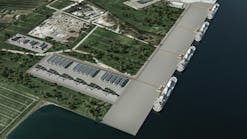ABB supplying Electrical systems for two Plug Power Green Hydrogen plants
ABB will deliver the electrical systems for two new hydrogen plants in North America.
Plug Power is developing the two plants in New York and Georgia, respectively. Together, the two facilities are expected to produce 60 tons of green liquid hydrogen per day.
Hydrogen itself does not burn a carbon atom and is seen as a net-zero tool for both power generation, industrial and transportation sectors. To be qualified as truly green H2, however, it must be produced from electrolysis powered by carbon-free resources such as wind, solar or nuclear.
ABB will provide the full electrical system encased in an ABB eHouse solution – a prefabricated, walk-in, modular outdoor substation hosting a range of electrical, automation and ancillary equipment that provides the site and process power. ABB will also supply gas and air insulated switchgear, low voltage motor control centers, along with low voltage variable speed drives for auxiliary applications.
The two green H2 plants being developed by Plug Power are Project Gateway in Genesee County, New York, and Peachtree in Camden County, Georgia. Together, the planned 60 tons of daily output will contain as much energy as 170 tons of fossil fuels while avoiding close to 20,000 tons of carbon dioxide emissions per year, according to the release.
Et tu H2?: Can truly Green Hydrogen join Solar & Storage in overthrowing Carbon Kings?
Subscribe to EnergyTech's free Newsletter for more Insights into the C&I Energy Transition
“Plug Power’s investment in both the Project Gateway and Peachtree facilities shows our commitment to the region, our customers, and the future world we want to live in,” said Sanjay Shrestha, General Manager of Energy Solutions and Chief Strategy Officer of Plug Power. “ABB showed the focus, understanding and expertise to execute a successful project, and we look forward to collaborating on driving the broader hydrogen economy.”
New York’s Project Gateway would be the North American continent’s largest green hydrogen production facility at 45 metrics tons per day, the companies say.
“Green hydrogen will only become a widespread clean energy carrier if industry can scale up technologies and bring the overall production costs down,” said Brandon Spencer, President, ABB Energy Industries. “ABB’s goal is to help make hydrogen accessible as quickly and cost-effectively as possible to meet the growing global demand.
-- -- --
(Rod Walton, senior editor for EnergyTech, is a 14-year veteran of covering the energy industry both as a newspaper and trade journalist. He can reached at [email protected]).






